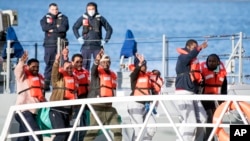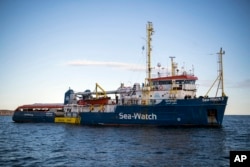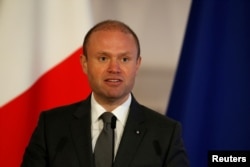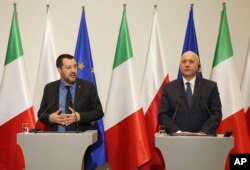Maltese Prime Minister Joseph Muscat announced Wednesday that his country would allow 49 migrants stranded on two German NGO vessels off its coasts to disembark on the island. The deal was reached after eight European Union nations agreed to take the migrants into their countries.
The 49 migrants rescued by two German humanitarian vessels, the Sea Watch and Sea Eye, disembarked Wednesday using Maltese military patrol boats because the NGO ships have not been granted access to the port in La Valletta. For days, the migrants had been waiting to know what would happen to them. But the worsening weather conditions with strong winds and heavy seas helped reach a deal.
Thirty-two migrants on the Sea Watch had been rescued on December 22. The other 17 on the Sea Eye were saved on December 29. Conditions for them on board were complicated by a lack of supplies.
Eight European Union countries finally agreed to take the migrants if Malta would allow them to disembark. They included Germany, France, Portugal, Ireland, Romania, Luxembourg, The Netherlands and even Italy, which has been very vocal about not allowing more migrants on to its shores. Talks are ongoing with other countries as well.
Until Tuesday, the Maltese prime minister maintained that his island had already allowed the disembarkation of 249 migrants in late December and could not allow others to follow suit without an agreement for them as well. He got his way. Those migrants too will be re-distributed in EU states, although a small number of them will stay in Malta. Some will also be returned to their country of origin, including 44 from Bangladesh.
Prime Minister Muscat said every hour that went by without a solution was not something he was proud of. In the end, he said, “A solution was found, but not by Europe, it was found by some of the member states.”
The deal reached showed fractures in the Italian government where Prime Minister Giuseppe Conte said Italy’s acceptance of a group of migrant children with their parents would not affect the government’s crackdown on accepting migrants. Interior Minister Matteo Salvini criticized the deal, saying it will further encourage human traffickers.
Speaking in Poland, Salvini said, “Our objective is to safeguard external frontiers and not to redistribute inside Europe what risks becoming a huge problem.” The interior minister added that an Italian police operation Wednesday led to the arrest of a number of North Africans charged with favoring illegal immigration, including one who praised Islamic terrorism.
EU Migration Commissioner Dimitris Avramopoulos said that leaving the migrants at sea for so many days has not been an example of “Europe's finest hour.” He called for a much-needed reform of EU asylum rules, saying the bloc cannot count “on disorganized, ad hoc solutions.” Currently, the asylum claims of migrants must be processed in the countries where they first arrive.







